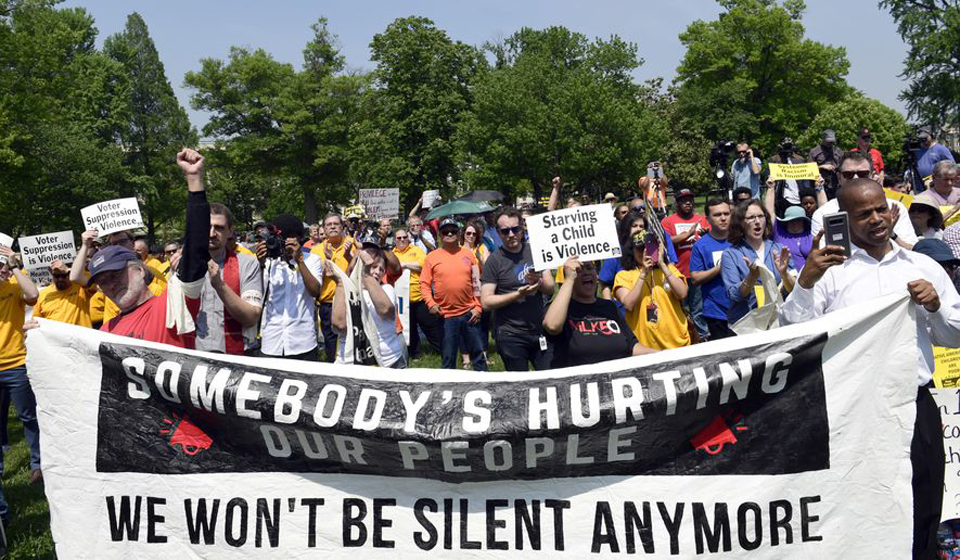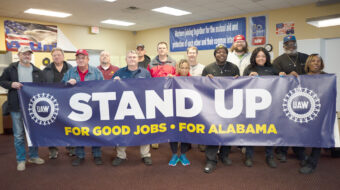
WASHINGTON–Callie Greer knew how to get a crowd’s attention: She wailed for her dead daughter, killed by poverty in the state of Alabama.
The Selma resident brought her grief, symbolizing that of tens of thousands of mothers nationwide whose children die because their families lack enough money to live on, to the launch of the New Poor People’s Campaign in the Nation’s Capital on May 14.
As campaign leaders Revs. William Barber II and Liz Theoharis looked on, Greer explained the reason her daughter died was because her mother made too little to afford medical care for her daughter’s life-threatening illness.
“That’s what a nation ought to hear,” Barber said of Greer’s wails, comforting her as well.
“Her daughter died because Alabama refused to expand Medicaid,” which would have covered the daughter. The GOP-run state could have expanded Medicaid, at federal expense, under the Affordable Care Act.
It is lack of health care, rampant poverty, environmental injustice, systematic racism and ties to an economy dependent on militarism and war that brought Greer, Barber, Theoharis and hundreds of others – including members of the Teachers, the United Food and Commercial Workers and the Service Employees — to Washington. Thousands more thronged to 37 state capitols nationwide.
And it won’t be the last time.
The New Poor People’s Campaign will hold rallies in D.C. every Monday between now and June 23, teach-ins and programs on poverty during other days of the week, a mass rally at the Capitol on that June day, and a multi-year campaign to turn the nation around, morally, ethically and politically, Barber declared.
“Do you want a revolution?” Barber asked. “Yes!” the D.C. crowd roared. He repeated the question and got the same reply.
“Are you sure you want a revolution?” “Yes!”
That revolution includes the right to organize, a $15 minimum wage and a union, and an end to so-called right to work laws around the U.S., Barber said. It also includes full citizenship for immigrants. The powers-that-be, he added, “take their (immigrants’) tax dollars” and profit from the immigrants’ work “but won’t give them the right to vote.”
Those immigrants include groups whom GOP President Donald Trump is throwing out of the country: The 800,000 young people who benefited from the Obama-era Deferred Action for Childhood Arrivals program and the hundreds of thousands of adults from Haiti, Syria, at least one African nation and several nations in Central America who have been here for years under Temporary Protected Status.
Barber and Theoharis outlined the NPPC’s goals and roused the crowd to bring the problems of the nation’s 140 million poor to the forefront of the national discussion. The campaign denounces economic inequality, demands criminal justice reform, a guaranteed job for all, equal educational opportunity, repeal of the Trump-GOP tax cut for the rich, and an end to voter repression directed against minorities, workers, women, the poor, the old and the young.
“Equal protection under the law is non-negotiable,” Barber said.
Then the two leaders turned their microphone over to people who could put a face on those numbers of the poor – like Greer and like Carolina Alas, a 48-year-old worker at a Jack in the Box fast food store in California.
“I work hard cooking and cleaning to make $11 an hour,” she told the D.C. crowd through an interpreter from her Spanish. “And it’s still not enough.” Her 16-year-old son wanted to help increase the family’s income by taking a job at a Burger King.
But he needed a car to get there. Alas had only her own old, beat-up car. Had she made $15 an hour – the minimum wage, plus the right to unionize, that is an NPPC goal – Alas could have helped him get that car.
“I wonder how our lives would have been different,” she mused. Her son got the job, but had to find other ways to get to work, including walking. “He never had the opportunity. A truck hit him one night as he was leaving the Burger King parking lot” to walk home. If I had had the money” by earning a decent wage “he could have had his car – and he’d be here today.”
“I’m not the only mother living in poverty, and it’s not because we don’t want to work. It’s because of politicians and their decisions to block health care and living wages and our right to live,” Alas stated.
“We have to stand shoulder to shoulder, fighting for the right to organize, so we do not have to worry about being able to take care of our families.”
Whether Trump, the Republican-run Congress, the mainstream media and even politicized preachers will pay attention is another matter, Barber said. That’s why the NPPC will keep going for years, beyond June, he told the crowd.
“While our president is getting bigots and religious heretics to do his work” – including ministers “who don’t like Palestinians and don’t like Jews, but just (like) the dollars they get” – “We will see a Christian woman, a Muslim man and a rabbi to talk about justice” for the poor, Barber added.












Comments